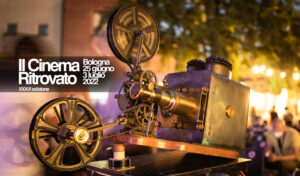Il Cinema Ritrovato 2022 | First Preview
Dear friends of Il Cinema Ritrovato,
at the beginning of the summer, our beloved festival will return to the cinemas and piazzas of Bologna in full glory. At a time when the world seems beset with darkness and anxiety, it is more important than ever that we join together and celebrate our strongest sources of hope, action and meaning, to ease the sadnesses of recent times.
The festival goes back to its usual dates: we therefore invite you to join us in Bologna from June 25th to July 3rd, 2022 for the real thing!
The festival is set to return to its pre-pandemic format, which means full access to our regular venues and schedule, a live, restriction-free thrill of immersion for our exciting, international array of cinephiles. Although the virtual world served us well during the pandemic, we are leaving it behind for the real experience – meeting friends new and old, moving from one cinema to another, dining out: drunk on the brilliance of cinema.
2020 and 2021 were years of necessity, and we introduced an online edition of the festival with a selection of films being made available for worldwide streaming. Now thanks to the gradual removal of pre-existing restrictions, we would rather get back to the way we define a festival experience, with an audience in full, enthusiastic attendance and films shown on the big screen. Therefore, from 2022 onwards, only masterclasses and panel discussions will be streamed online.
While we return to full capacity, one of the pandemic-era features we wish to retain is the booking system, which proved to be both popular and practical. Audiences will no longer have to worry about securing a seat, and will be able to easily plan their viewing schedules. As before, your festival pass will give you unlimited access to the majority of the screenings and events, both indoor and outdoor.
With the reopening of the newly restored underpass just under ‘Palazzo Re Enzo’, this year’s festival attendees will have the opportunity to visit Folgorazioni figurative, an exhibition devoted to Pier Paolo Pasolini, born 100 years ago in Bologna. We think this to be a fantastically fitting marriage between one of Bologna’s great cinematic sons, and a festival steeped in local history.
Look out for our future newsletters, which will reveal further information regarding the film line-up and the luminary guests who will turn Il Cinema Ritrovato into a nine-day celebration of film history, with illuminating testimonies and talks. In upcoming newsletters, you can find out about Cinemalibero, Buster Keaton, the new silent and sound restorations, the documentary section, and the kids’ special programme.
Over the past few years, we have fought relentlessly to keep the festival alive as a real, physical event; to keep it alive as the Il Cinema Ritrovato that we have loved so much. There were many tears and plenty of smiles and we have learned not to take the joy of watching films together, shoulder-to-shoulder, for granted.
Also this year, the Bologna Opera House Orchestra, conducted by Timothy Brock, will be back to Piazza Maggiore to accompany two masterpieces turning 100: the magnificent Foolish Wives by Erich von Stroheim will be the first cine-concert on June 27th, while on July 2nd one of the cornerstones of horror and expressionist cinema, Nosferatu by F.W. Murnau, will likely hypnotise Piazza Maggiore audience.
As usual, Il Cinema Ritrovato will welcome guests, friends, directors, film historians, actors: we are thrilled to confirm the presence of John Landis who, in addition to holding a masterclass, will be in Piazza Maggiore on July 3rd.
Just get to Bologna, we’ll do the rest!
__________________________________________________________________________________
Forever Sophia
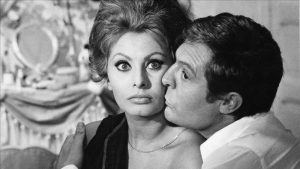 A symbol of a country’s rebirth from the postwar period to the 1960s, going from national beauty queen to international glamour idol, Sophia Loren is one of the most recognisable Italian icons in the world. Yet, beyond glamour, her filmography reveals hidden treasures, forgotten gems and nuanced roles. Her multifaceted acting career took different trajectories: from melodrama, to pink neorealism – her bursting personality flanked by Marcello Mastroianni – to her revelation as a dramatic actress in Two Women and her crowning achievement in A Special Day. Plus in Hollywood she worked with luminaries such as George Cukor, Stanley Donen and, of course, Charles Chaplin. There are more roles in Italian films to be rediscovered by audiences all over the world as now, more than ever, Sophia Loren’s characters need to be seen and enjoyed on big screen.
A symbol of a country’s rebirth from the postwar period to the 1960s, going from national beauty queen to international glamour idol, Sophia Loren is one of the most recognisable Italian icons in the world. Yet, beyond glamour, her filmography reveals hidden treasures, forgotten gems and nuanced roles. Her multifaceted acting career took different trajectories: from melodrama, to pink neorealism – her bursting personality flanked by Marcello Mastroianni – to her revelation as a dramatic actress in Two Women and her crowning achievement in A Special Day. Plus in Hollywood she worked with luminaries such as George Cukor, Stanley Donen and, of course, Charles Chaplin. There are more roles in Italian films to be rediscovered by audiences all over the world as now, more than ever, Sophia Loren’s characters need to be seen and enjoyed on big screen.
Curated by Emiliano Morreale and Gian Luca Farinelli
Photo (© Reporters Associati & Archivi): Ieri oggi domani by Vittorio De Sica (Yesterday, Today and Tomorrow, 1963)
The Drifter’s Escape: Hugo Fregonese
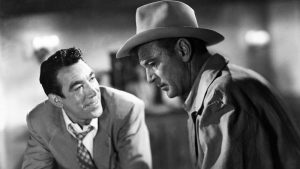 As swiftly as some directors changed studios, Hugo Fregonese (1908-87) changed countries. The perfect ‘saddle tramp’ figure, he drifted and made films about drifting and escape. A master of brisk and unsentimental westerns and crime thrillers, with a career spanning over four decades and numerous bases of production – from his home country Argentina, to America, Spain, Italy, the UK and West Germany – Fregonese’s cinema is unjustly underappreciated to the point of obscurity. This is a step in the direction of claiming him as an important figure; one whose cinema of impassioned subjectivity blends the aesthetic of low-budget films with fatalism, myth and raw violence. Fregonese’s name is often associated with the ten films he made during his five-year residency in Hollywood in the 1950s. This programme picks some of the finest from that period to screen alongside films made elsewhere. Forming one of the most coherent cinematic oeuvres that one could expect from a wandering director, this will be one of the major revelations of Il Cinema Ritrovato 2022.
As swiftly as some directors changed studios, Hugo Fregonese (1908-87) changed countries. The perfect ‘saddle tramp’ figure, he drifted and made films about drifting and escape. A master of brisk and unsentimental westerns and crime thrillers, with a career spanning over four decades and numerous bases of production – from his home country Argentina, to America, Spain, Italy, the UK and West Germany – Fregonese’s cinema is unjustly underappreciated to the point of obscurity. This is a step in the direction of claiming him as an important figure; one whose cinema of impassioned subjectivity blends the aesthetic of low-budget films with fatalism, myth and raw violence. Fregonese’s name is often associated with the ten films he made during his five-year residency in Hollywood in the 1950s. This programme picks some of the finest from that period to screen alongside films made elsewhere. Forming one of the most coherent cinematic oeuvres that one could expect from a wandering director, this will be one of the major revelations of Il Cinema Ritrovato 2022.
Curated by Dave Kehr and Ehsan Khoshbakht
Photo: Blowing Wild by Hugo Fregonese (1953)
The Last Laugh: German Musical Comedies, 1930-32
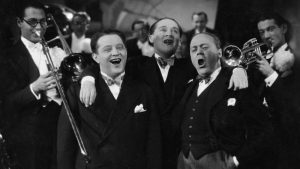 For a few precious years, a decidedly light-hearted, sensual and frivolous spirit swept through German movie theatres. The musical comedies of the late Weimar Republic, produced in a short period between the coming of sound and before the Nazi takeover are some of the hidden gems of that era, presented at this year’s festival. Rooted in the operetta tradition of the 19th century but adapted to contemporary aesthetics and mores, these films introduced popular comedians and singers to the movie audience, while celebrating the urbane, sophisticated and hedonistic modernity of the Weimar Republic’s cultural scene. The selection covers a wide variety of comedic and musical styles and especially focuses on the rich contributions of Jewish directors, screenwriters, producers, composers, and actors in the genre, almost all of whom were forbidden to work in Germany after 1933. Indeed, the genre can be described as a glimpse into an alternative pathway in film history, a window into a lost world.
For a few precious years, a decidedly light-hearted, sensual and frivolous spirit swept through German movie theatres. The musical comedies of the late Weimar Republic, produced in a short period between the coming of sound and before the Nazi takeover are some of the hidden gems of that era, presented at this year’s festival. Rooted in the operetta tradition of the 19th century but adapted to contemporary aesthetics and mores, these films introduced popular comedians and singers to the movie audience, while celebrating the urbane, sophisticated and hedonistic modernity of the Weimar Republic’s cultural scene. The selection covers a wide variety of comedic and musical styles and especially focuses on the rich contributions of Jewish directors, screenwriters, producers, composers, and actors in the genre, almost all of whom were forbidden to work in Germany after 1933. Indeed, the genre can be described as a glimpse into an alternative pathway in film history, a window into a lost world.
Curated by Lukas Foerster
Photo: Das Kabinett des Dr. Larifari by Robert Wohlmuth (1930)
Peter Lorre: Stranger in a Strange Land
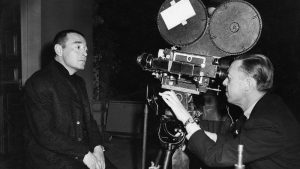 His voice summons angels and demons, his body and face are those of a child heavy with guilt. Referred to as “the greatest living actor” by Charles Chaplin in the 1930s and an inspiration for literary giants from Brecht to Graham Greene to Elfriede Jelinek, Peter Lorre is also The Lost One – a title he chose for his only directorial work. All in all, Lorre’s life, his films, his unrealized dreams and his physical presence constitute one of the most honest representations of 20th century man. Instead of wholeness and triumph, there is the half-full, half-empty result of traversing through Central European modernism and fascism, addiction and exile, the culture of money and fame, the mirror cabinet of faces and masks. From improvisational theatre in Vienna to the dissolution of the classical studio system. “Haunted by his early success in Fritz Lang’s M (1931) he died a Hollywood caricature at age 59” – that standard one-liner about Peter Lorre is not entirely false, but it misses 90 percent of what this series hopes to evoke.
His voice summons angels and demons, his body and face are those of a child heavy with guilt. Referred to as “the greatest living actor” by Charles Chaplin in the 1930s and an inspiration for literary giants from Brecht to Graham Greene to Elfriede Jelinek, Peter Lorre is also The Lost One – a title he chose for his only directorial work. All in all, Lorre’s life, his films, his unrealized dreams and his physical presence constitute one of the most honest representations of 20th century man. Instead of wholeness and triumph, there is the half-full, half-empty result of traversing through Central European modernism and fascism, addiction and exile, the culture of money and fame, the mirror cabinet of faces and masks. From improvisational theatre in Vienna to the dissolution of the classical studio system. “Haunted by his early success in Fritz Lang’s M (1931) he died a Hollywood caricature at age 59” – that standard one-liner about Peter Lorre is not entirely false, but it misses 90 percent of what this series hopes to evoke.
Curated by Alexander Horwath
Photo: Peter Lorre on the set of The Beast with Five Fingers by Robert Florey (1946)
“Tell the Truth!”: A View Into Yugoslav Cinema
 Established in 1918 as the Kingdom of Serbs, Croats and Slovenes, Yugoslavia constituted one of the most socio-politically, culturally, religiously, and ethnically diverse states in modern Europe. The 1950s and the 1960s saw the birth of formidable new artists and aesthetic innovations charged along diametrically different planes, supported by a sophisticated national studio system. Artists faced pertinent issues challenging contemporary Yugoslav reality, breaking taboos and forging new means of cinematic expression. This programme, featuring some fantastic new restorations along with archive prints, takes us from the classical post-war cinema to the New Wave and celebrates the works of master filmmakers of the era. What emerges are films which carry a power to speak the truth – awakening the mind and quickening the soul – in ways that can be said only for major chapters in the history of world cinema.
Established in 1918 as the Kingdom of Serbs, Croats and Slovenes, Yugoslavia constituted one of the most socio-politically, culturally, religiously, and ethnically diverse states in modern Europe. The 1950s and the 1960s saw the birth of formidable new artists and aesthetic innovations charged along diametrically different planes, supported by a sophisticated national studio system. Artists faced pertinent issues challenging contemporary Yugoslav reality, breaking taboos and forging new means of cinematic expression. This programme, featuring some fantastic new restorations along with archive prints, takes us from the classical post-war cinema to the New Wave and celebrates the works of master filmmakers of the era. What emerges are films which carry a power to speak the truth – awakening the mind and quickening the soul – in ways that can be said only for major chapters in the history of world cinema.
Curated by Mina Radović
Photo: Tri by Aleksandar Petrović (1965)
Kenji Misumi: An Instinctive Auteur
 Kenji Misumi (1921-75), whose centenary was celebrated last year, is one of the unsung masters of the Japanese period film. Nicknamed ‘Little Mizoguchi’, he worked at Daiei for the bulk of his career, crafting films of stylistic brilliance and unforced moral gravity in the 1960s. He was a specialist above all in chambara (the action-packed variety of period film), which he imbued with remarkable Freudian undercurrents and imaginative widescreen imagery; but he also created convincing films focused on modern martial arts and on the romantic experiences of women. Mentored by Teinosuke Kinugasa, he shared his taste for expressionist imagery, but developed a style all his own and is regarded in Japan as a significant auteur. The centrepiece of the retrospective will be the so-called ‘sword trilogy’, recently restored in 4K by Kadokawa, which comprises some of Misumi’s outstanding visual and thematic achievements.
Kenji Misumi (1921-75), whose centenary was celebrated last year, is one of the unsung masters of the Japanese period film. Nicknamed ‘Little Mizoguchi’, he worked at Daiei for the bulk of his career, crafting films of stylistic brilliance and unforced moral gravity in the 1960s. He was a specialist above all in chambara (the action-packed variety of period film), which he imbued with remarkable Freudian undercurrents and imaginative widescreen imagery; but he also created convincing films focused on modern martial arts and on the romantic experiences of women. Mentored by Teinosuke Kinugasa, he shared his taste for expressionist imagery, but developed a style all his own and is regarded in Japan as a significant auteur. The centrepiece of the retrospective will be the so-called ‘sword trilogy’, recently restored in 4K by Kadokawa, which comprises some of Misumi’s outstanding visual and thematic achievements.
Curated by Alexander Jacoby and Johan Nordström
Photo: Ken ki by Kenji Misumi (Sword Devil, 1965)
Peter Weiss – Poetry in Motion
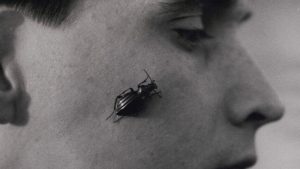 German-born painter, poet, novelist, playwright and filmmaker, Peter Weiss (1916-82) was a pioneering figure in the Swedish art and experimental film scene in the 1950s. His experimental shorts bulge with visual poetry in their rendering of the body and the human condition, while his remarkable documentary shorts give stunning testimony to Weiss’ eye for detail and ability to find human dignity even in the most difficult circumstances. Films from both categories are featured in this programme, however, the centerpiece is Weiss’ feature-length Hägringen (1959), an extraordinary and very personal take on ‘city symphony’ about a young man’s 24-hour encounter with Stockholm and with society at large. The films, from the collection of Swedish Film Institute, will be presented in vintage prints and DCPs of recent digital restorations.
German-born painter, poet, novelist, playwright and filmmaker, Peter Weiss (1916-82) was a pioneering figure in the Swedish art and experimental film scene in the 1950s. His experimental shorts bulge with visual poetry in their rendering of the body and the human condition, while his remarkable documentary shorts give stunning testimony to Weiss’ eye for detail and ability to find human dignity even in the most difficult circumstances. Films from both categories are featured in this programme, however, the centerpiece is Weiss’ feature-length Hägringen (1959), an extraordinary and very personal take on ‘city symphony’ about a young man’s 24-hour encounter with Stockholm and with society at large. The films, from the collection of Swedish Film Institute, will be presented in vintage prints and DCPs of recent digital restorations.
Curated by Jon Wengström
Photo: Hägringen by Peter Weiss (1959)
The Century of Cinema: 1902
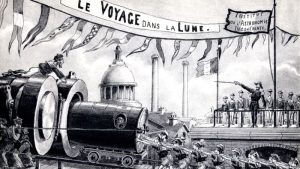 A crucial year for travelling back in time, as one of the brightest stars in the universe of early cinema appeared in it under the mundane-sounding number “Star Film 399-411”. Of course, today we know it as A Trip to the Moon by Georges Méliès. This, as well as his fantastic trick films and gorgeous fairy tale films and the imitations by Gaston Velle (chez Lumière Bros) and Ferdinand Zecca (chez Pathé) are some of the highlights in the programme. The great variety of genres already on offer by Pathé frères is another remarkable aspect of that year’s production, pre-announcing the dramatic expansion and worldwide success of cinematography in the years to come.
A crucial year for travelling back in time, as one of the brightest stars in the universe of early cinema appeared in it under the mundane-sounding number “Star Film 399-411”. Of course, today we know it as A Trip to the Moon by Georges Méliès. This, as well as his fantastic trick films and gorgeous fairy tale films and the imitations by Gaston Velle (chez Lumière Bros) and Ferdinand Zecca (chez Pathé) are some of the highlights in the programme. The great variety of genres already on offer by Pathé frères is another remarkable aspect of that year’s production, pre-announcing the dramatic expansion and worldwide success of cinematography in the years to come.
Curated by Mariann Lewinsky and Karl Wratschko
Photo: Le Voyage dans la lune by Georges Méliès (Trip to the Moon, 1902)
One Hundred Years Ago: 1922
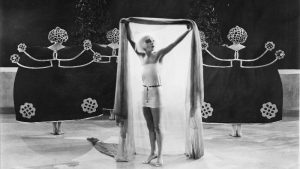 If looking for masterpieces, this year there’ll be films by luminous figures such as Dreyer, Flaherty, Nazimova, Vertov, Delluc, Murnau, Dwan, and Stroheim. But if you want to go beyond the canon, there’ll be works of Zhang Shichuan, Teuvo Puro and Warren A. Newcombe and by a choice selection of short films, among them two newly restored silhouette films by animation pioneer Lotte Reiniger. A special celebration is due to Albert Samama Chikli and his daughter Haydée Tamzali who a hundred years ago made together Zohra, the first Tunisian fiction film.
If looking for masterpieces, this year there’ll be films by luminous figures such as Dreyer, Flaherty, Nazimova, Vertov, Delluc, Murnau, Dwan, and Stroheim. But if you want to go beyond the canon, there’ll be works of Zhang Shichuan, Teuvo Puro and Warren A. Newcombe and by a choice selection of short films, among them two newly restored silhouette films by animation pioneer Lotte Reiniger. A special celebration is due to Albert Samama Chikli and his daughter Haydée Tamzali who a hundred years ago made together Zohra, the first Tunisian fiction film.
Curated by Mariann Lewinsky and Karl Wratschko
Photo: Salomé by Charles Bryant and Alla Nazimova (1922)
The Poisoned Flowers of Victorin-Hippolyte Jasset
 Tribute to a man who has directed over 160 films in under five years and deserves undying fame for having introduced pulp crime fiction to cinema. After a career as costume designer and director of theatrical mass spectacles, Victorin-Hippolyte Jasset (1862-1913) created the first ever crime and spy series featuring the detective Nick Carter, the cruel Genius of Evil Zigomar and intrepid Protéa the spy-catcher, while the title of some of his lost films are equally intriguing and unashamedly pulp: Meskal the Smuggler, Docteur Phantom and The Vulture of Syria. In 1910 he went to Tunisia, and the (partly lost) films he directed there together with Georges Hatot are well-documented by a wealth of stills recently rediscovered in the archives of the still photographer Albert Samama Chikli.
Tribute to a man who has directed over 160 films in under five years and deserves undying fame for having introduced pulp crime fiction to cinema. After a career as costume designer and director of theatrical mass spectacles, Victorin-Hippolyte Jasset (1862-1913) created the first ever crime and spy series featuring the detective Nick Carter, the cruel Genius of Evil Zigomar and intrepid Protéa the spy-catcher, while the title of some of his lost films are equally intriguing and unashamedly pulp: Meskal the Smuggler, Docteur Phantom and The Vulture of Syria. In 1910 he went to Tunisia, and the (partly lost) films he directed there together with Georges Hatot are well-documented by a wealth of stills recently rediscovered in the archives of the still photographer Albert Samama Chikli.
Curated by Émilie Cauquy, Hiroshi Komatsu and Mariann Lewinsky
Photo: Italian poster of Zigomar, peau d’anguille by Victorin-Hippolyte Jasset (1911)
Super8, 9.5mm & 16 mm – Great Small Gauges
 In this year’s edition we focus on one hand on the collection of the university of Paderborn dedicated to small gauge films by female experimental filmmakers from the German-speaking countries made between 1964 and the 2000s, including directors like Ute Aurand, Elfi Mikesch, Christine Noll Brinckmann and many more. On the other hand, we will celebrate the anniversary of the 9.5mm format which came on the market in the year 1922, with presentations from the collections of Home Movies, Les Inedits, Fondation Jérôme Seydoux-Pathé and Lichtspiel/Kinemathek Bern, to be projected with a vintage 9.5mm projector. Again, the machines will be as wondrous as the films.
In this year’s edition we focus on one hand on the collection of the university of Paderborn dedicated to small gauge films by female experimental filmmakers from the German-speaking countries made between 1964 and the 2000s, including directors like Ute Aurand, Elfi Mikesch, Christine Noll Brinckmann and many more. On the other hand, we will celebrate the anniversary of the 9.5mm format which came on the market in the year 1922, with presentations from the collections of Home Movies, Les Inedits, Fondation Jérôme Seydoux-Pathé and Lichtspiel/Kinemathek Bern, to be projected with a vintage 9.5mm projector. Again, the machines will be as wondrous as the films.
Curated by Annette Brauerhoch and Karl Wratschko
Photo: Kool Killer di Pola Reuth (1981)
Not Only Films
Il Cinema Ritrovato DVD Awards
Two international juries, one of critics and one of filmmakers, will pick the best home-video releases of the year.
Book Fair
The most tempting collection of film books, DVDs, Blu-rays and posters offered inside the Renzo Renzi Library. Leave some empty room in your luggage!
FIAF Film Restoration Summer School
The ninth edition of the summer school dedicated to film restoration, promoted by FIAF, ACE, Cineteca di Bologna and L’Immagine Ritrovata, will finally take place in Bologna, after the forced postponement of the 2020 edition.
Pier Paolo Pasolini. Folgorazioni Figurative
Bologna, Sottopasso di Piazza Re Enzo, until 16th October 2022
The exhibition explores the dialogue between the great works of art history and Pasolini’s cinematographic work.
Il Cinema Ritrovato Board 2022
Directors: Cecilia Cenciarelli, Gian Luca Farinelli, Ehsan Khoshbakht, Mariann Lewinsky
Artistic Committee: Richard Abel, Peter Bagrov, Peter Becker, Janet Bergstrom, Kevin Brownlow, Gian Piero Brunetta, Ian Christie, Lorenzo Codelli, Eric de Kuyper, Bryony Dixon, Shivendra Singh Dungarpur, Bernard Eisenschitz, Alexander Horwath, Aki Kaurismäki, Dave Kehr, Martin Koerber, Hiroshi Komatsu, Miguel Marías, Nicola Mazzanti, Mark McElhatten, Olaf Möller, Alexander Payne, Chema Prado, Elif Rongen-Kaynakçi, Jonathan Rosenbaum, Thelma Schoonmaker, Martin Scorsese, Jon Wengström, Karl Wratschko
Programming Committee: Guy Borlée, Roberto Chiesi, Paola Cristalli, Anna Fiaccarini, Goffredo Fofi, Andrea Meneghelli, Paolo Mereghetti, Emiliano Morreale, Davide Pozzi, Elena Tammaccaro
Coordinator: Guy Borlée
Promoted by: Fondazione Cineteca di Bologna
Supporters: Gaumont, The Film Foundation, Pathé
With the support of: Comune di Bologna, Ministero della Cultura – Direzione generale Cinema e audiovisivo, Regione Emilia-Romagna – Assessorato alla Cultura, Europa Creativa – Programma MEDIA
Buy your pass on-line
Bologna Welcome will provide festivalgoers with complete information about accommodation in Bologna, as well as travelling tips. Early birds will have better opportunities and benefit from special rates. Click here to discover more.
Info and contacts
Cineteca di Bologna
Via Riva di Reno, 72 – 40122 Bologna – Italia
Tel +39 0512194814/4211
ilcinemaritrovato@cineteca.bologna.it



